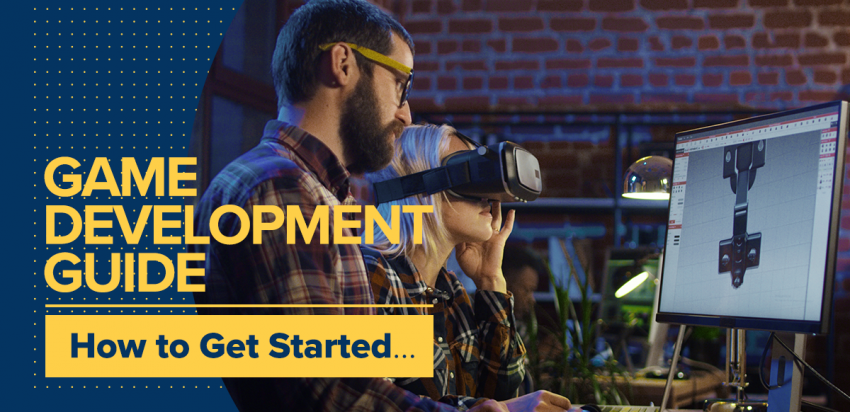The Best Way to Learn Programming for Game Development
 Making your own games can be a fun and rewarding hobby, but it does require learning how to code. As someone just getting started, it’s natural to feel overwhelmed by all the programming languages out there and wonder which one is best to learn first. In this post, I’ll share my thoughts on the best approach for a beginner to take in learning to code for games.
Making your own games can be a fun and rewarding hobby, but it does require learning how to code. As someone just getting started, it’s natural to feel overwhelmed by all the programming languages out there and wonder which one is best to learn first. In this post, I’ll share my thoughts on the best approach for a beginner to take in learning to code for games.
Don’t Worry About Choosing the “Best” Language Yet
When you’re first starting out, don’t get too hung up on picking the perfect programming language. The most important thing is just to get experience coding something, even if it’s a simple project. All programming languages involve learning fundamental concepts like variables, functions, conditionals, loops, data structures, and more. Getting comfortable with these basic programming skills will serve you well no matter what language you eventually specialize in.
To begin, I recommend trying out a few beginner-friendly languages until you find one that clicks. Popular choices for new programmers include Python, JavaScript, and C#. These languages have gentle learning curves and allow you to focus on learning programming logic without all the additional complexities of lower-level languages like C++. Try building small games, calculators, or utility programs to get a feel for coding. The language you start with isn’t permanent - you can always switch later once you have basic skills down.
Game Engines Make Development Easier
Once you have the fundamentals of a language, your next step is learning how to build actual games. This is where using a game engine can really help speed up the learning process. Game engines provide tools and APIs that handle a lot of the complex technical work behind graphics, physics, audio, and more. This allows beginners to focus on game design rather than programming every tiny detail from scratch.
Some popular free and easy-to-use game engines include Unity (C#), Godot (GML/Python), Construct 3 (JavaScript), and Pico-8 (Lua). I’d recommend choosing an engine that uses a language you’re already familiar with from your initial learning projects. Engines with visual node-based interfaces like Construct 3 are also very beginner-friendly. Take time to go through engine tutorials to understand how everything fits together before trying to build your own games.
Consider C++ For More Advanced Projects
While languages like Python and Unity’s C# allow you to make complete games, C++ is still widely considered the “best” language for more advanced 3D or performance-critical games. It offers exceptionally high performance since it compiles directly to machine code rather than interpreting. C++ is still very complex for beginners to learn though.
My advice would be to stick with higher-level languages like Python or C# until you’ve built a few small games or game prototypes. Once you feel confident in your programming skills and want to push into more serious game development, then it may be worth starting to learn C++ in parallel. Many game programming courses and books offer introductions to C++ tailored for those with existing programming experience. With practice over time, C++ becomes much more approachable.
Game Jams Are A Great Learning Tool
Game jams are events, typically a few days long, where individuals or teams create games based on a theme within a time limit. They are an immensely valuable way to gain experience actually finishing game projects while networking in the community. Regular jams will help keep you motivated and create milestones to work towards.
I recommend participating from the very beginning, even if the games are simple. Jams teach valuable lessons in rapid prototyping, scope management, teamwork, and finishing with quality despite tight deadlines. Many are also excellent places to get feedback from other developers. Major organizations like Ludum Dare and Global Game Jam host regular free online jams accessible to newcomers. Treat each one as an opportunity to apply and improve your skills.
Keep Learning Through Online Tutorials
Even beyond formal classes or books, there are endless free tutorials online to help expand your game development knowledge. Reading documentation, watching video lectures, and completing interactive courses in your spare time is a great way to continuously learn.
Some top sites for programming and game development tutorials include:
- Codecademy - Interactive exercises for many languages.
- SoloLearn - Quiz-based courses with helpful forums.
- Udemy - Affordable video courses on diverse topics.
- YouTube - Channels like The Coding Train, Brackeys, and Fireship.
- GameFromScratch - In-depth tutorials on specific game engines and techniques.
Be sure to take breaks between study sessions for your brain to consolidate information. Revisiting concepts over time through varied study methods will serve you much better than cramming all at once. Be patient, trust the process, and keep learning day by day.
I hope these tips provide a helpful starting point and framework to launch your journey into game development through coding. Remember, it’s a marathon not a sprint. Have fun along the way, and don’t hesitate to keep asking the community questions when you get stuck. Happy coding!